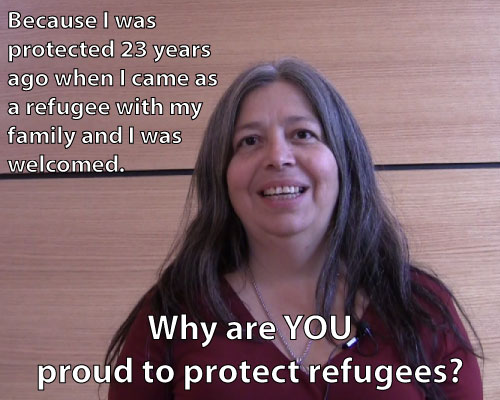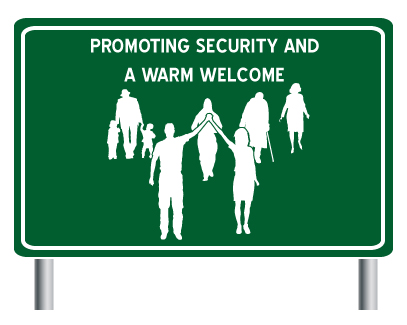|
Current issue and campaign pages: Are you proud to protect refugees? Take action this Refugee Rights Day (4 April) Cuts to the Interim Federal Health Program Refugee Reform - Bill C-31 changes to the refugee determination system |
|
Upcoming CCR meetings in 2013: Spring Consultation, Thursday, May 30 - Saturday, June 1 2013, Vancouver Fall Consultation, Thursday, November 28 - Saturday, November 30, Kitchener-Waterloo |
|
New CCR reports |
CONTENTS:
- Why are you proud to protect refugees? Take action this Refugee Rights Day (4 April)
- How do recent immigration and refugee policy changes affect women and girls?
- Dramatic Drop in Refugee Settlement to Canada
- Marketing Immigration Enforcement: Privacy issues at play
- Register now for the national Spring Consultation in Metro Vancouver, 30 May - 1 June 2013
---
 How will you mark Refugee Rights Day this April 4th? Join us in launching the ‘Proud to Protect Refugees’ campaign and help transform the conversation about refugees in Canada.
How will you mark Refugee Rights Day this April 4th? Join us in launching the ‘Proud to Protect Refugees’ campaign and help transform the conversation about refugees in Canada.
Starting this Refugee Rights Day, help promote a positive vision of what we want for refugees in Canada and of the important contributions refugees make to our communities. Show your pride at work, at school, at city hall, at your place of worship and online. Raise refugee voices. Encourage groups and individuals near you to get involved. Need some ideas? Check out the ‘Proud to Protect Refugees’ webpage for resources and more.
Why ‘Proud to Protect Refugees’?
Recent changes to Canada's refugee system and increased negative rhetoric about newcomers may make it tougher for refugees to find protection and to feel welcome in Canada. Under the banner of ‘Proud to Protect Refugees’, we can make sure that Canada’s tradition of a warm welcome and protection remains strong. ‘Proud to Protect Refugees’ starts a long-term campaign to branch out and change the way that we view refugee rights, refugees and others seeking protection in Canada.
For more information and to get involved, see: http://ccrweb.ca/en/proud-to-protect-refugees
What is Refugee Rights Day?
April 4th is the anniversary of the Supreme Court’s 1985 Singh decision, an important milestone for refugee rights in Canada. In commemoration, this day has become known as Refugee Rights Day. Join others on this important anniversary and recognize refugee rights in Canada.
For activities, ideas and resources, go to: http://ccrweb.ca/en/refugee-rights-day There have been many recent changes in immigration and refugee policies in Canada. How might these changes affect women and girls? The CCR has compiled a summary of key concerns for women and girls, which include:
There have been many recent changes in immigration and refugee policies in Canada. How might these changes affect women and girls? The CCR has compiled a summary of key concerns for women and girls, which include:
- Impacts of reforms to Canada's refugee determination system
- Cuts to refugee health care
- Long delays in refugee family reunification
- Conditional permanent residence for sponsored spouses
- Increased vulnerability of migrant workers in Canada
- Access to protection for women and girls who have been trafficked
To read the full analysis, visit: http://ccrweb.ca/en/key-issues-women-and-girls-2013
In the past month, the CCR has expressed our deep disappointment at the dramatic decrease in the number of refugees resettled to Canada in 2012. Contrary to recent government promises to resettle more refugees, it is the second lowest number resettled in over 30 years.
In December 2011, at a meeting commemorating the 60th anniversary of the Refugee Convention, in Geneva, Switzerland, the Minister of Citizenship and Immigration announced: “We pledge to increase the number of refugees we resettle by 20%.”
In fact, 26% fewer refugees were resettled in 2012 than in 2011, or than were planned for 2012.
Resettled refugees come in two streams: Government-Assisted Refugees and Privately Sponsored Refugees. Arrivals in both categories decreased dramatically in 2012. Only 5,412 Government-Assisted Refugees were resettled – the lowest number since at least the 1970s, and over 2,000 short of the target for 2012 of 7,500.
At 4,212, arrivals of Privately Sponsored Refugees were well below the target for 2012 of 5,500. Private sponsors had been promised this target in return for the imposition of limits on the numbers of new applications they could submit.
One of the challenges in 2012 was that Canada had planned to resettle a significant proportion of refugees through the Damascus office, which was forced to close in January 2012 due to the conflict in Syria. This highlights the problems with concentrating the resettlement program too much in one region. The CCR urges the government to take a more global approach and resettle refugees in need from anywhere in the world.
However, this problem could only account for part of the shortfall, and the government had most of the year to shift its focus elsewhere. The UNHCR has identified many refugees around the world in need of resettlement, many of them on an urgent basis.
For more information, including statistics for the numbers of resettled refugees to Canada in the past few years, see: http://ccrweb.ca/en/bulletin/13/03/07
 Recent news about immigration raids played out for a reality TV show has drawn attention to the Canada Border Services Agency's interest in strategies of mass appeal, at the expense of individuals' privacy and dignity. But it's not the first example.
Recent news about immigration raids played out for a reality TV show has drawn attention to the Canada Border Services Agency's interest in strategies of mass appeal, at the expense of individuals' privacy and dignity. But it's not the first example.
In 2011, CBSA published a "most wanted" list of 30 so-called "suspected war criminals", complete with mugshots, and asked the public for assistance in locating them. The strategy raised many concerns and the Canadian Council for Refugees filed a complaint with the Privacy Commissioner (we are still waiting for a response).
Internal documents show that, a year or so on, CBSA worried that public interest in their list was lagging and that there was a "lack of sufficient cases" to populate the list.
To read more from the CCR on the government's publicity strategy, read: http://ccrweb.ca/en/marketing-immigration-enforcement
 Refugees come to Canada seeking safety for themselves and their families.
Refugees come to Canada seeking safety for themselves and their families.
Discussions at Promoting Security and a Warm Welcome will address issues that challenge refugees, immigrants, advocates and community workers. In addition to larger plenary sessions, workshops and working sessions will produce strategies for further collaboration and specific actions. Some of the topics include:
- Future directions in refugee resettlement
- New refugee determination system: sessions with government officials
- Promising practices in serving vulnerable populations
- Building bridges with indigenous peoples
Information about the consultation and online registration are available at: ccrweb.ca/meetings
Register before 10 May to take advantage of the reduced fees!
